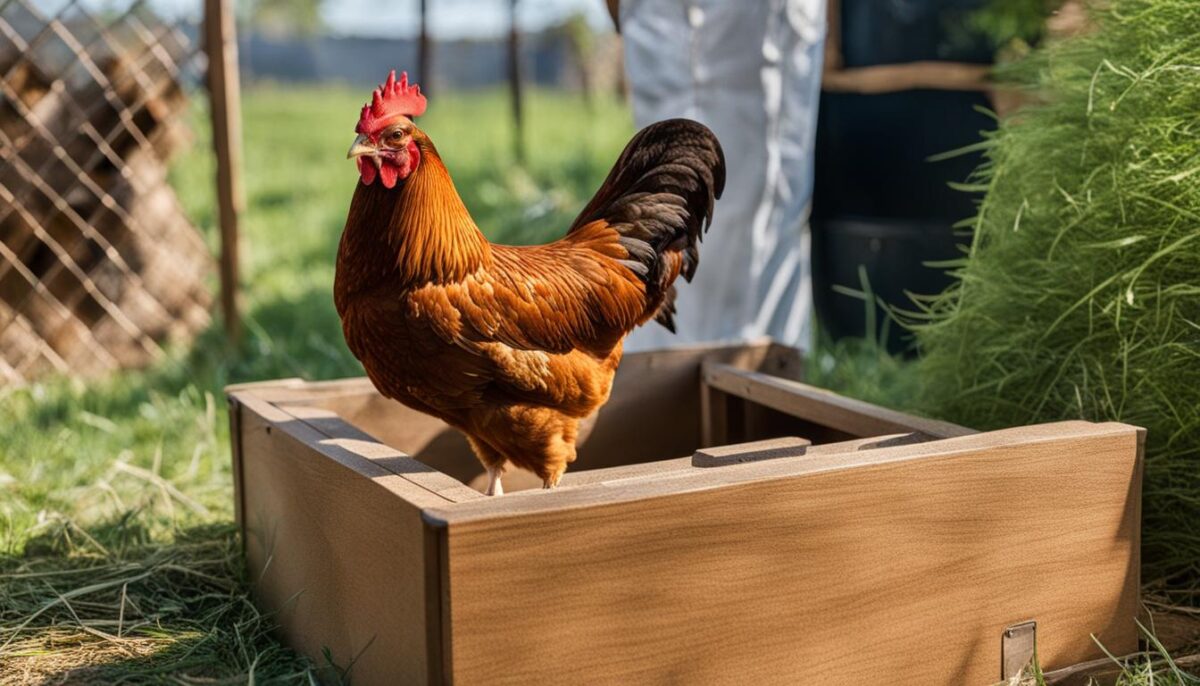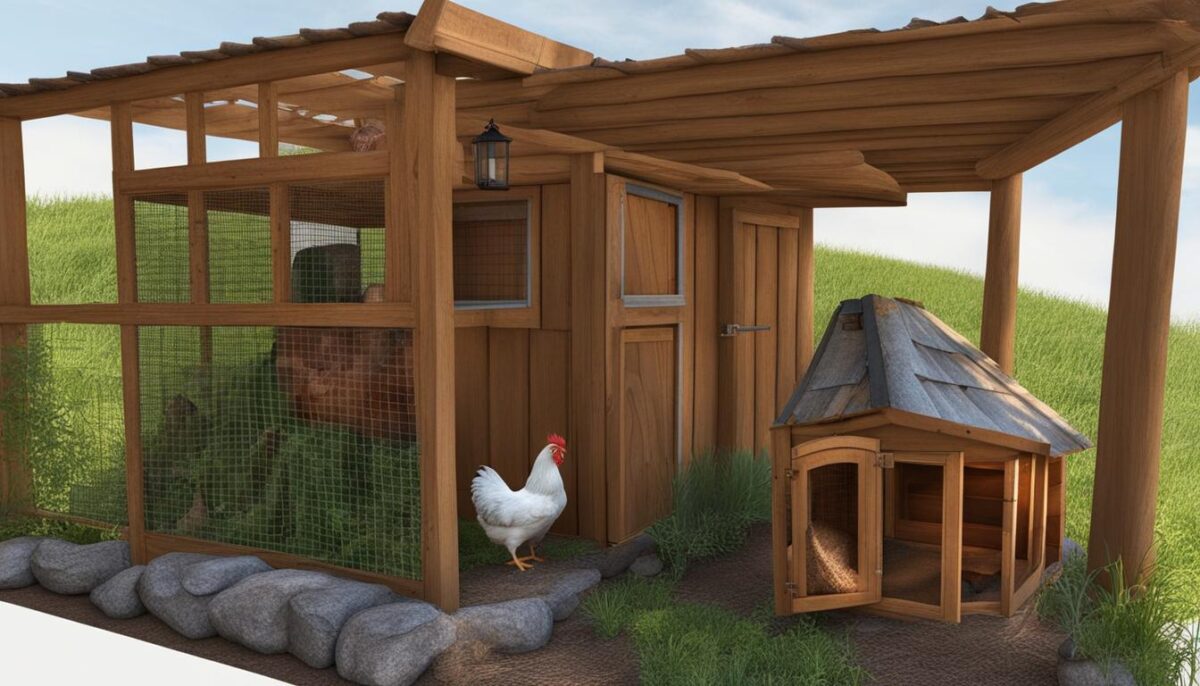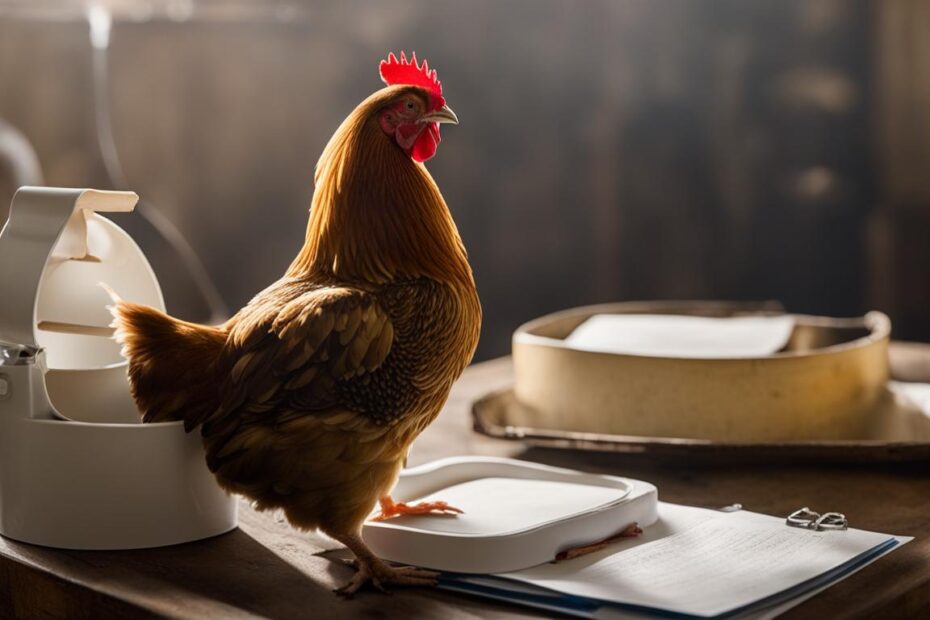While chickens are often seen in the barnyard rather than in homes, many claim that chickens can be potty-trained and make great companion animals. Chickens have fascinating behaviors and can provide food by laying eggs and pest control by eating bugs. There is anecdotal evidence that suggests chickens have the ability to control their bowels and develop a habit of going in a designated spot.
Key Takeaways:
- Chickens can be potty-trained and make interesting indoor pets.
- There is anecdotal evidence supporting the idea that chickens can control their bowels and develop a habit of going in a designated spot.
- Potty training a chicken involves creating a pattern-based habit and rewarding the chicken for going in the designated spot.
- If potty training is not successful, using chicken diapers can be an alternative.
- Consider the responsibilities and commitments involved in raising an indoor pet chicken before bringing one into your home.
The Plausibility of Potty Training a Chicken
When it comes to potty training a chicken, you might wonder if it’s really possible. While there isn’t much official documented information on the subject, there are positive anecdotal accounts available on the internet. Chickens, like other animals, have their own bathroom habits, and there is evidence to suggest that they have the natural ability to “hold it” to some extent.
One interesting observation is that broody hens, which are chickens that are preparing to lay eggs, tend to avoid defecating in their nests. This behavior implies that chickens have some level of control over their bowels. It also suggests that with the right training and reinforcement, they might be able to develop a habit of going in a designated spot.
While potty training a chicken may not be as straightforward as training a dog or a cat, the plausibility of the task is supported by these behavioral observations. With patience, consistency, and positive reinforcement, it may be possible to teach a chicken to go in a specific area.
The Plausibility of Potty Training a Chicken:
| Factors | Observations |
|---|---|
| Broody Hens | Broody hens avoid defecating in their nests. |
| Controlled Bowels | Chickens have some level of control over their bowels. |
| Positive Anecdotal Evidence | Many chicken owners claim success in potty training their chickens. |
While potty training a chicken is not guaranteed to be easy, the plausibility of the task suggests that it might be worth trying for those interested in indoor chicken keeping or having a potty-trained chicken as a companion animal.
Potty Training Process for Chickens
Potty training a chicken may seem like a challenging task, but with patience and consistency, it can be accomplished. The key to successful potty training is to create a pattern-based habit for your chicken. Here is a step-by-step process to help you train your chicken to use a litter box or potty outside:
Step 1: Timing and Observation
Start by observing your chicken’s defecation patterns. Chickens usually eliminate shortly after waking up, eating, or drinking. Take note of these times to establish a routine.
Step 2: Choose an Assigned Spot
Select a specific area for your chicken to eliminate, whether it’s a litter box filled with sand, a designated outdoor spot, or a piece of newspaper. Make sure it’s easily accessible for your chicken.
Step 3: Command and Reward
When you notice your chicken is about to eliminate, gently pick it up and place it in the assigned spot. Use a command, such as “Go potty” or “Outside time,” to associate with the action. Once your chicken eliminates in the designated spot, reward it with a treat and praise.
Repeat this process consistently, every time you notice your chicken is about to eliminate. Over time, your chicken will develop a habit and start associating the command with the desired behavior.
It’s important to note that accidents may still happen, especially during the early stages of training. Be patient and continue reinforcing the desired behavior. Placing paper beneath the roost at night can help with morning cleanup and prevent accidents outside of the designated area.

Remember that every chicken is unique, and some may respond better to training than others. Don’t get discouraged if your chicken takes longer to potty train. With consistent training and positive reinforcement, you can increase the chances of success.
Chicken Diapers as an Alternative
For those who find potty training a chicken to be a challenging task or if the chicken doesn’t grasp the concept, using chicken diapers can be a viable alternative. Chicken diapers are increasingly popular among chicken keepers who choose to keep their chickens indoors. These specially designed diapers are meant to keep the chicken’s body clean and prevent feces from soiling the surrounding areas.
Chicken diapers need to be changed regularly to maintain hygiene and prevent discomfort for the bird. They are available in various sizes and styles, ensuring a proper fit for different chicken breeds. The diapers typically have adjustable straps to secure them around the chicken’s body, allowing the bird to move around comfortably.
Using chicken diapers also provides a practical way to control chicken manure. Instead of following the chicken around and cleaning up after it, the diaper catches the feces, making cleanup much easier. Additionally, chicken diapers can be beneficial for indoor environments, as they prevent undesirable odors and keep living spaces cleaner.
| Benefits of Chicken Diapers | Considerations for Using Chicken Diapers |
|---|---|
|
|
Overall, chicken diapers provide a practical solution for controlling chicken manure and maintaining a cleaner living environment when keeping chickens indoors. While potty training a chicken is an option, the use of chicken diapers can offer convenience and ease for chicken keepers who prefer this alternative approach.
Quote:
“Chicken diapers have been a game-changer for me. They make it so much easier to keep my chickens indoors without worrying about messes or odors. Plus, they’re just adorable!”
– Sarah, an enthusiast chicken keeper
Training Chickens to Come When Called
Training chickens to come when called can be a useful skill for chicken keepers, allowing them to easily round up their flock or bring individual chickens to a specific location. While it may seem unusual, chickens are intelligent animals that can be trained to respond to commands.
To start recall training for chickens, choose a specific sound or word that will serve as the chicken’s recall command. This can be a whistle, a unique vocal cue, or even the shaking of a treat container. The key is to consistently use the same sound or word every time you want the chicken to come to you.
Next, associate the recall command with a reward. Chickens are highly motivated by food, so offering a treat whenever you call them will encourage them to come. Start by using the recall command and immediately giving the chicken a treat. Repeat this process several times a day until the chicken starts to associate the command with the reward. Over time, the chicken will learn to come when called.
| Training Chickens to Come When Called | Recall Command: Shake of a treat container | Reward: Treat |
|---|---|---|
| Step 1 | Use the recall command and give the chicken a treat | Repeat multiple times a day |
| Step 2 | Continue using the same recall command and reward | Repeat consistently over time |
| Step 3 | Practice recall training in different locations | Continue reinforcing the behavior |
Training chickens to come when called requires patience and consistency. It is essential to reinforce the behavior regularly and practice in different locations to ensure the chicken responds reliably. With dedicated training, you can have a flock of chickens that come running whenever you call them.
Benefits of Having an Indoor Pet Chicken
Having an indoor pet chicken can offer a range of benefits that go beyond the traditional role of chickens as barnyard animals. Chickens can bring a sense of calm and joy to a household, creating a unique and enjoyable pet experience. Their quirky behaviors and amusing antics can provide endless entertainment for both adults and children alike.
Furthermore, chickens can also offer companionship, forming unique bonds with their human caretakers. Their friendly and social nature allows them to develop relationships with their owners, providing a sense of connection and emotional support. In fact, some individuals find therapeutic value in the presence of chickens, finding comfort and solace in their company.
Additionally, indoor pet chickens can serve as a learning opportunity, especially for children. By caring for a chicken, children can learn about responsibility, compassion, and the natural lifecycle of animals. This hands-on experience can foster a sense of curiosity and empathy towards other living creatures.
Key Benefits of Having an Indoor Pet Chicken:
- Calming and joy-bringing presence
- Endless entertainment from their quirky behaviors
- Companionship and unique bonds
- Therapeutic value for emotional support
- Learning opportunity for children
Overall, having an indoor pet chicken can be a rewarding and enriching experience. From their calming presence to the therapeutic value they provide, chickens can bring unique benefits to a household. However, it’s crucial to consider the responsibilities and commitment involved in raising an indoor pet chicken, ensuring they receive proper care, attention, and a suitable living environment.
Raising an Indoor Pet Chicken: Considerations
Before deciding to raise an indoor pet chicken, there are important considerations to keep in mind. While having an indoor pet chicken can be a unique and rewarding experience, it is crucial to understand the needs of these animals and the commitment required to provide them with a suitable living environment.
One of the main considerations is the lifespan of a chicken, which can range from seven to nine years. It is essential to be prepared to care for the chicken for its entire life and ensure that you can meet its needs for food, water, shelter, and medical care. Additionally, consider your lifestyle and long-term plans, as chickens require daily care and attention.
Poop management is another aspect to consider when raising an indoor pet chicken. Chickens produce a significant amount of waste, and it is important to have a plan in place to handle it. This could involve following the chicken around and cleaning up as it happens, using chicken diapers, or designating a specific area that is easy to clean.
Lastly, consider your vacation plans and how they might impact the care of your indoor pet chicken. Chickens require consistent care and attention, so it is important to have a reliable caregiver or a plan in place to ensure the chicken’s well-being while you are away.
Where will a Chicken Stay Indoors?
When keeping a chicken indoors as a pet, it is important to designate a specific area for the chicken to stay. This will help ensure that the chicken feels secure and comfortable in its environment. Some people choose to give their chickens full access to their house, allowing them to roam freely in designated areas. Others prefer to restrict the chickens to certain rooms or spaces within the home. The choice ultimately depends on the individual’s living situation and preferences.
Creating a comfortable and safe environment for the indoor pet chicken is essential. The designated area should be spacious enough for the chicken to move around comfortably, with access to food, water, and a cozy roosting spot. It is important to provide adequate ventilation and natural light in the designated area. The space should also be easy to clean and maintain, as chickens can produce a significant amount of poop.
Restricted Areas for Chickens:
- Kitchen: Due to hygiene and food safety concerns, it is generally not recommended to allow chickens in the kitchen.
- Bedrooms: Chickens may cause disruptions and create messes in bedrooms, so it is advisable to keep them out of these areas.
- Bathrooms: Bathrooms can be unsafe for chickens due to wet surfaces and cleaning chemicals.
By establishing restricted areas and providing a suitable space for the indoor pet chicken, it is possible to create a harmonious living arrangement that allows for the enjoyment of having a feathered friend indoors.

Managing Poop with an Indoor Pet Chicken
When it comes to raising an indoor pet chicken, one of the most significant challenges is managing their poop. Chickens produce a substantial amount of waste, and it’s important to have a plan in place to keep your home clean and odor-free. There are several options for effectively managing chicken poop in an indoor setting.
One approach is to follow the chicken around and clean up waste as it happens. This requires constant vigilance and may be time-consuming, especially if you have a busy schedule. Another option is to use chicken diapers, which are specially designed garments that catch the poop and keep the chicken’s body clean. Diapers need to be changed regularly to prevent discomfort and ensure proper hygiene for the chicken.
Alternatively, you can designate a specific area for the chicken to roam freely, ensuring that it is easily cleanable. This can be a section of the house with washable flooring or a designated space in a garage or basement. Using appropriate barriers, such as baby gates or pet fences, can help contain the chicken within the designated area, minimizing the spread of poop throughout your home.
It’s important to note that regardless of the method you choose, regular cleaning and maintenance are essential for maintaining a healthy and hygienic environment for both you and your indoor pet chicken. By staying on top of poop management, you can enjoy the companionship and unique benefits of having a chicken as a pet without the mess becoming overwhelming.
Conclusion
Raising an indoor pet chicken can be a rewarding experience for those who are prepared for the responsibilities involved. Not only can chickens provide companionship and entertainment, but they can also have therapeutic value, bringing joy and alleviating pain for some individuals. The benefits of having an indoor pet chicken are numerous.
However, it’s important to consider the needs of the chicken and plan for its care. Indoor pet chickens require a commitment for their entire lifespan, which can be seven to nine years. Poop management is a necessary aspect of keeping chickens indoors, and options such as following the chicken around, using chicken diapers, or designating a cleanable area should be taken into account.
So, if you have decided to raise an indoor pet chicken, make sure to create a comfortable and safe environment for it. Consider the responsibilities involved and be prepared to provide the care and attention that your chicken needs. With proper planning and commitment, you can enjoy the benefits of having an indoor pet chicken as part of your household.
FAQ
Can you potty train a chicken?
While there is not much official documented information, there is positive anecdotal evidence that suggests chickens can be potty-trained.
How plausible is potty training a chicken?
Coop behaviors indicate that chickens have the ability to control their bowels and develop a habit of going in a designated spot.
What is the process of potty training a chicken?
Potty training a chicken involves creating a pattern-based habit by timing their defecations, taking them to an assigned spot, issuing a command, and rewarding them with a treat.
Can chicken diapers be used as an alternative?
Yes, chicken diapers can be used for chicken keepers who have chickens indoors. Diapers need to be changed regularly to keep the chicken clean.
How can chickens be trained to come when called?
By associating a specific greeting or command with food or treats, chickens can learn to recognize the sound and come towards it.
What are the benefits of having an indoor pet chicken?
Indoor pet chickens can provide companionship, entertainment, and even therapeutic value. They can bring joy to a household and help alleviate pain.
What considerations should be made when raising an indoor pet chicken?
Before getting an indoor pet chicken, it’s important to understand the responsibility and commitment involved, including poop management and vacation plans.
Where will a chicken stay indoors?
The chicken can be given full access to the house or restricted to certain rooms, depending on personal preference.
How can poop be managed with an indoor pet chicken?
Options for poop management include following the chicken around and cleaning up as it happens, using chicken diapers, or designating an easily cleanable area for the chicken to roam.
What should be considered when raising an indoor pet chicken?
It’s important to plan for the needs of the chicken, including poop management and vacation arrangements, and be prepared for the responsibilities involved.


